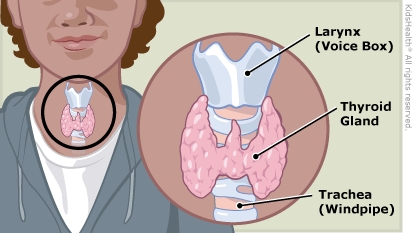Goiter: How to Care for Your Child
The thyroid makes hormones that do many important things, such as helping with brain development, growth, pubertal development, and how the body uses energy. A goiter (GOY-tur) is an enlarged thyroid that forms a bump on the front of the neck. People with a goiter may have normal, low, or high levels of thyroid hormones.
Treatment depends on the cause of the goiter and levels of thyroid hormones. If treatment is needed, it will usually make the goiter smaller or keep it the same size.


-
If your health care provider prescribed thyroid medicine:
-
Give it exactly as instructed.
-
Ask if your child needs to take it on an empty stomach.
-
Check to see if your child needs to make any diet changes.
-
Be sure to tell your health care provider if your child starts any new medicines, vitamins, or dietary supplements.
-
Support your child's overall well-being by helping them:
-
Eat a healthy diet with whole-grain breads and cereals, lean meats like chicken and other good sources of protein (such as fish, eggs, beans, and nuts), and plenty of fresh fruits and vegetables.
-
Be physically active every day.
-
Be sure your child goes to all follow-up visits for exams, blood tests to check thyroid hormone levels, and medicine changes (if needed).

-
Your child has any new or worsening symptoms such as tiredness, constipation (hard, infrequent poops), jitteriness, or a fast heartbeat.
-
The goiter gets larger or causes pain or trouble swallowing.
-
Your child has trouble taking the thyroid medicine.

Your child:
-
has trouble breathing from the goiter
-
is very sleepy, agitated, or confused, or has a seizure
-
is shaking or sweaty, or has a very fast heartbeat

What causes goiters? In kids, Grave's disease causes most goiters. The immune system attacks parts of the thyroid, making it swell and make too much thyroid hormone (hyperthyroidism). A goiter can also happen from an infection or thyroid tumor. Someone who doesn't get enough iodine in their diet also can get a goiter. (This is rare in the U.S. because most people get enough iodine from their diet).
How are goiters treated? A goiter doesn't always need treatment. Health care providers may prescribe medicine if someone has too much thyroid hormone (hyperthyroidism) or too little thyroid hormone (hypothyroidism). Sometimes, if the goiter doesn't go away or is very big, surgery is needed.